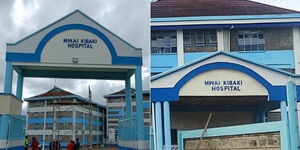Kenyans seeking treatment for assault-related injuries, which require a P3 form from the police before accessing medical services, may soon be able to pay for the document using the Social Health Authority (SHA) insurance.
Interior Cabinet Secretary Kipchumba Murkomen made the announcement on Wednesday during the Jukwaa la Usalama public engagement forum in Eldoret City following concerns raised by residents.
Citizens at the forum decried the current system, noting that it was both inconvenient and expensive to access urgent medical care due to delays in obtaining the P3 form - a crucial document in cases of assault and related incidents.
Some residents argued that the cost of obtaining a P3 form denies victims their constitutionally guaranteed right to access healthcare under Article 43 of the Constitution of Kenya.
Murkomen acknowledged the concerns and promised to initiate discussions with relevant government bodies to amend existing protocols, allowing SHA to cover the cost of the P3 form as part of its benefits.
“I am going to propose, through the relevant agencies, that anyone who has been assaulted and needs to file a P3 form should be able to do so through SHA. If SHA can be used for treatment, let it also cover the cost of the form,” Murkomen stated.
He further pledged to engage President William Ruto to formalise the proposal, adding: “I will ask the President to make it official - that our people access P3 costs through SHA. It is possible, because that is part of treatment.”
The CS praised the Jukwaa la Usalama forums for generating practical community-driven solutions to everyday challenges, especially around policing and public safety.
“That is the importance of these engagements. Look at that brilliant idea - having the P3 covered by SHA. Even the minister did not have it,” Murkomen said.
SHA, established under the Social Health Insurance Act 2023, is tasked with implementing Kenya’s universal health coverage model. It oversees three key funds: the Primary Healthcare Fund for outpatient services, the Social Health Insurance Fund for inpatient and specialized services, and the Emergency, Chronic and Critical Illness Fund for urgent and life-threatening conditions.
Under the current structure, SHA covers a broad range of services including maternal care, emergency treatment, chronic disease management, and surgery. However, victims of assault are still required to obtain a P3 form from police stations - often at a fee - before they can access treatment in some cases, creating a significant barrier for those in urgent need.
The form, which serves both legal and medical purposes, is not currently covered by any public insurance fund.
By integrating this legal-medical documentation into SHA’s emergency or general coverage, the government could eliminate a financial and procedural hurdle that delays access to justice and critical care.












